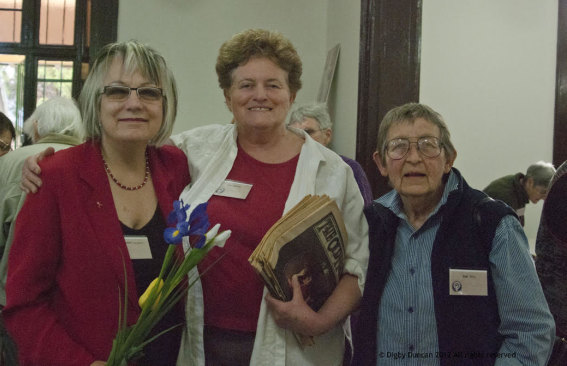The Chequerboard program opened up the public debate on homosexuality to the wider community and the welcome reforms which followed over the next decades culminating in the legalisation of same-sex marriage.
She did not remain an activist in CAMP, and explained it was because of the sexism she experienced. She became an active lesbian feminist inside the women’s movement from 1972 to the end of the century. She continued her support for many causes, lending material and advice to the makers of the highly acclaimed documentary, Brazen Hussies.

From left: Meredith Burgmann, Suzanne Bellamy and Sue Wills at a women’s liberation anniversary function.Credit:Digby Duncan
She completed her doctorate thesis on The Politics of Sexual Liberation in 1981 at the University of Sydney, where she worked as a tutor in the department of government and pursued research on sexual violence.
In 1984 Wills was appointed Macquarie University’s first equal opportunity officer and played an important role in changing the university’s academic promotion practices. She worked closely with the vice chancellor, Edwin Webb, and managed to gain important changes to interview panels, and to establish standardised questioning of job applicants, all of which is now common practice but was considered revolutionary at the time.
Macquarie became the most feminised (highest proportion of women academics) university in Australia under this leadership.
She was also very personally supportive of female academics and was aware of femalejob applicants’ failure to see themselves as properly qualified whereas less-qualified men had no problems applying for senior positions. She nagged her female colleagues about this mercilessly.

Some of those at the forefront of Australia’s Gay Liberation movement: (L-R) Peter Bonsall-Boone, Sue Wills, Peter de Waal, Fabian Lo Schiavo and Robert Walmsley, pictured in 1990.Credit:Fairfax
Her experience in homosexual law reform and equal opportunity legislation fostered an interest in legal issues and she picked up a diploma in law in 2002.
Before and after her equal opportunity appointment she was also a key member of the politics and international relations discipline, where she taught public policy until her retirement in 2007. Her early lectures on the politics of homophobia were groundbreaking. It was the first time many students had even thought about the concept. In fact, it was so new that in her first few lectures she used the term “homosexphobia” rather than the now accepted “homophobia”.
She inspired many students, activists, practitioners and academics, and her classes were memorable for her ability to bring complex issues to life with cutting analysis, humorous observations, and rich and colourful (often first-hand) anecdotes. Her political passions permeated her life.
Wills devoted herself in the past two decades to gathering documents, interviewing women and accessing archives to write The First Ten Years of Sydney Women’s Liberation, a project she commenced with great friends Suzanne Bellamy, Penny Ryan and Joyce Stevens. These papers are now archived in the State Library, but the book remains unfinished.
Wills was a guest speaker at the Jessie Street National Women’s Library in November 2013 when she outlined the challenging writing task she had set herself for The First Ten Years, acknowledging the early work with Joyce Stevens on the chronology which was published in issues of the Australian Feminist Studies journal. She wanted to write an engaging account so that the technique of novelists was important to her to evoke the exciting and energising world of 1970s Sydney women’s liberation.

Much of Sue Wills’ academic writings are now housed at the State Library of NSW.Credit:Peter Braig
Wills, among other activists, was featured in the 2005 film, The Hidden History of Homosexual Australia. In 2009, she was featured as a panellist at the 40th anniversary celebrations for Australia’s Gay Pride and in 2010 was honoured by the AIDS Council of New South Wales (ACON) as a community hero in their annual honour awards.
Wills is remembered by colleagues for her wit and tenacity and readiness to help others. She was free of sentimentality about past campaigns disabusing those who forgot the many internal conflicts. She never left a job unfinished, but the project on which she laboured in her last years was left incomplete.
Wills has donated relevant portions of her extensive collection of books and feminist posters to Jessie Street National Women’s Library. Her home in Leichhardt was her haven and the research base for The First Ten Years. It contains an archive which is a tribute to her commitment and dedication and her tireless efforts to record the history of the women’s movement faithfully, without the embellishments which sometimes accompany many feminist activist anecdotes.
She was pedantic about facts and often challenged self-serving accounts. Direct and honest with her many friends, she enjoyed a warm respect but suffered few fools. She was a rich source for documentary evidence and a mentor and adviser for many an academic writing political and feminist history. An avid reader of non-fiction, piles of new books graced her coffee table among the Australian Book Review and the New York Review of Books. She shared and exchanged titles generously with a view to a future lively discussion.
Wills died peacefully at the Chris O’Brien Lifehouse, where she had spent many months on and off battling lung cancer. There, she queried the doctors, discussed treatments, and cheerfully submitted to student examinations.
She will be missed by family, friends and fellow activists. She is survived by her sister, Philippa Shaw, her brother Donald Wills and seven nephews and two nieces, whom she loved dearly and spoilt shockingly.







